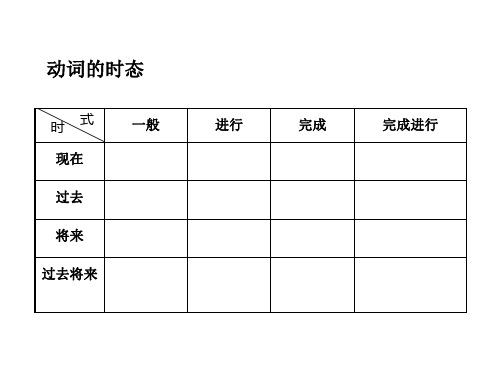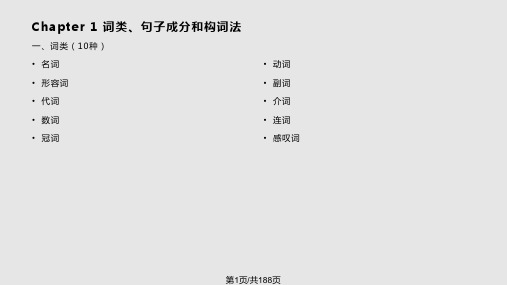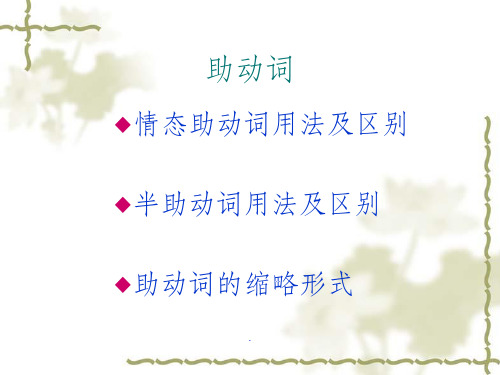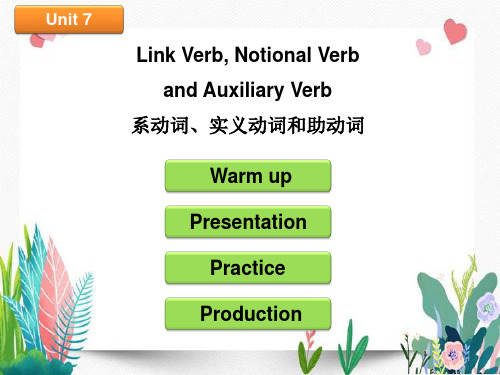英语语法PPT课件
合集下载
初中英语语法—形容词、副词 PPT课件 图文

A. correct B. correctly C. correctness D. correcting
5. They watched a movie and felt quite __A___ .
A. sad B. sadly C. sadness D. sady
形容词作宾语补 足语
某些动词如make,paint,keep,find, like,want等后接名词或代词作宾语,再接 形容词作宾语补足语,补充说明宾语的状态、 特征等。形容词和宾语一起构成复合宾 语.有的已构成固定词组。
an old big brown wooden box 一个旧而大的棕色木箱子 two tall young Japanese girls 两位高个、年轻的日本姑娘
例题
1) Tony is going camping with ___ boys. A. little two other B. two little other C. two other little D. little other two
1.He is a good student. 2. She is a beautiful girl. 3. I have a clever pet dog.
2)多个形容词做定语时的排列顺序:
口诀: 冠代数形大,新色国材名
注释: 冠----冠词;代----代词;数----数词;形----形状、 性质;大----大小、长短;新----新旧;色----颜色; 国----国家、产地;材----材料、用途;名-----名词
The windows of our classroom are cleaner than those of theirs.
形容词原级的常用句
5. They watched a movie and felt quite __A___ .
A. sad B. sadly C. sadness D. sady
形容词作宾语补 足语
某些动词如make,paint,keep,find, like,want等后接名词或代词作宾语,再接 形容词作宾语补足语,补充说明宾语的状态、 特征等。形容词和宾语一起构成复合宾 语.有的已构成固定词组。
an old big brown wooden box 一个旧而大的棕色木箱子 two tall young Japanese girls 两位高个、年轻的日本姑娘
例题
1) Tony is going camping with ___ boys. A. little two other B. two little other C. two other little D. little other two
1.He is a good student. 2. She is a beautiful girl. 3. I have a clever pet dog.
2)多个形容词做定语时的排列顺序:
口诀: 冠代数形大,新色国材名
注释: 冠----冠词;代----代词;数----数词;形----形状、 性质;大----大小、长短;新----新旧;色----颜色; 国----国家、产地;材----材料、用途;名-----名词
The windows of our classroom are cleaner than those of theirs.
形容词原级的常用句
英语语法:定语、状语、补语ppt课件

可编辑课件PPT
6
不定式短语作定语
不定式 不定式的基本形式:to+动词原形。 I have nothing to worry about. 我没什么好担忧的。
He gave me some books to read. 他给我一些书看。 注:不定式不能做谓语。
可编辑课件PPT
7
不定式作定语
Do you have anything more to say? 你还有什么话要说吗? There is nothing to worry about. 没什么好担心的。 I have a lot of homework to do. 我有很多作业要做。
可编辑课件PPT
9
句子作定语
句子作定语即是定语从句 She has found the necklace that she lost
two weeks ago. 她找到了两年前丢的项链。 It happened at the time when I left the
office. 这事就发生在我离开办公室之时。
可编辑课件PPT
10
状语
状语用来修饰动词、形容词或副词。 表示行为发生的时间、地点、目的、 方式、程度等。可作状语的有:副词、 介词短语、不定式、分词、形容词、 词组、复合结构、从句。
可编辑课件PPT
11
副词作状语
Speak politely.说话要有礼貌。 It is very nice of you.你真好。 Read loudly.大声读。
定语、状语、补语
定语
用来修饰名词或代词,可分为前置定 语和后置定语。一般由形容词、形容 词性物主代词(my、his、your、her 等)、数词、介词短语、不定式短语、 分词或句子充当。
英语语法16种时态介绍ppt课件

I'll write to you as soon as I arrive there. • 由if 引导的条件状语从句中可以用shall或will表
“意愿”,但不表示时态。
If you will accept my invitation and come to our party, my family will be pleased.如果你愿意接受并 参加我们的舞会,我的家人会非常高兴。
6)祈使句中 ( to give directions or instructions ) Go down the street, and then take the second turning on
the left.
知识扩展:一般现在时表将来
1)下列动词:come, go, arrive, leave, start, begin, return的一般 现在时表将来。这主要用来表示在时间上已确定或安排好的 事情 ( timetabled or fixed events )。 The train leaves at six tomorrow morning. When does the bus start? It starts in ten minutes.
You are always changing your mind. You are always doing well
He’s always asking the same question. 6. 状态动词的进行时后面接形容词brave; careful; stupid; clever; foolish; polite; kind; shy等时,为 主语所表现的非一般惯性特点或故意的行为。
6 )在the more…the more…句型中,从句也要用一 般现在时取代将来时。
“意愿”,但不表示时态。
If you will accept my invitation and come to our party, my family will be pleased.如果你愿意接受并 参加我们的舞会,我的家人会非常高兴。
6)祈使句中 ( to give directions or instructions ) Go down the street, and then take the second turning on
the left.
知识扩展:一般现在时表将来
1)下列动词:come, go, arrive, leave, start, begin, return的一般 现在时表将来。这主要用来表示在时间上已确定或安排好的 事情 ( timetabled or fixed events )。 The train leaves at six tomorrow morning. When does the bus start? It starts in ten minutes.
You are always changing your mind. You are always doing well
He’s always asking the same question. 6. 状态动词的进行时后面接形容词brave; careful; stupid; clever; foolish; polite; kind; shy等时,为 主语所表现的非一般惯性特点或故意的行为。
6 )在the more…the more…句型中,从句也要用一 般现在时取代将来时。
初中英语零基础学语法--英语句子结构 课件(共43张PPT)

附属成分
基本成分的修饰语。可以是: • 定语:即用来修饰名词的单词、短语或从句 • 状语:即用来修饰名词或代词以外的词的单词、短语或从句。
定语
Poor John tottered toward a hospital nearby. She likes oranges imported from the USA.
省略成分
句中被省略的成分,虽然未说出来,却在句中表示 一定的意思:
(You) Come here. (I wish you)Good luck! Some gave him praises,but others(gave him)rotten eggs.
He runs as fast as, if ( he does ) not ( run ) faster, than you. ( I ) Hope you like it. John should clean the room today and Peter ( should clean it ) tomorrow.
主语、动词(不及物动词、及物动词、双宾动词、系动词、宾 补动词)、宾语及补语可以称为基本句子成分。完整的句子一 般至少包含2个基本成分,至多4个基本成分。
Vi(不及物动词)
主 语
谓 语
Vt(及物动词)
宾语 宾语(直) 宾语(间) 宾语 宾补
系动词
表语
be / feel / seem / look appear / stand / lie become /get / grow / turn go / come / remain/ keep taste / smell etc.
连接成分
连接成分实际上是一个连词,用来连接两个或几个平行的词、
初中英语语法课件ppt

vacation together.
过去将来时的使用:
一、过去将来时表示对于过去某一时间而言将要发生的动 作或存在的状态。 would或was /were going to + V
would可用于各种人称。
二、would +V还可表示过去的习惯动作,在这点上同used to同义。
When we were children, we would/used to go swimming every summer.
e) 用于条件从句“如果……想,设想”(接近if ……want to,或 if ……should) 例:Greater efforts to increase agricultural production must be made if food shortage ____________ avoided. A) is to be B) can be C) will be D) has been
一般现在时的动词形式: 动词原形 1.am;is ;are 2.have,has 3.第三人称单数形式-(e)s
肯定句:I watch television every day.
否定句:I don’t watch television every day.
疑问句:Do you watch television every day.
一般现在时的使用:
1.一般现在时表示总是、通常、习惯 性的动作或状态。
It snows in winter. I watch television every day.
2.用于对客观事实的普遍性的陈述。
Water consists of hydrogen and oxygen. Most animals kill only for food. The world is round.
过去将来时的使用:
一、过去将来时表示对于过去某一时间而言将要发生的动 作或存在的状态。 would或was /were going to + V
would可用于各种人称。
二、would +V还可表示过去的习惯动作,在这点上同used to同义。
When we were children, we would/used to go swimming every summer.
e) 用于条件从句“如果……想,设想”(接近if ……want to,或 if ……should) 例:Greater efforts to increase agricultural production must be made if food shortage ____________ avoided. A) is to be B) can be C) will be D) has been
一般现在时的动词形式: 动词原形 1.am;is ;are 2.have,has 3.第三人称单数形式-(e)s
肯定句:I watch television every day.
否定句:I don’t watch television every day.
疑问句:Do you watch television every day.
一般现在时的使用:
1.一般现在时表示总是、通常、习惯 性的动作或状态。
It snows in winter. I watch television every day.
2.用于对客观事实的普遍性的陈述。
Water consists of hydrogen and oxygen. Most animals kill only for food. The world is round.
小学英语语法全套PPTppt课件

❖2. I do my homework every day.(改为一般疑 问句,作否定回答) ______________________________________
如: I don't like bread. 当主语为第三人称单数,用doesn‘t构成否定句
如:He doesn't often play.
一般疑问句:Do( Does ) 主语 动词原形 其它。 如- Do you often play football? - Yes, I do. / No, I don't.
2.行为动词:主语 行为动词( 其它)。如: We study English.我们学习英语。 当主语为第三人称单数(he, she, it)时,
要在动词 后加“-s”或“-es” 如:Mary likes Chinese.玛丽喜欢汉语。
一般现在时的变化 1. be动词的变化。 否定句:主语 be not 其它。
Class One. 3. We _______(not watch) TV on
Monday.
4. Nick _______(not go) to the zoo on Sunday. 5. _____ they ______(like) the World Cup?
6. _______ your parents ______(read) news papers every day?
小学英语语法总复习
(三至六年级)
小学英语语法
❖ 一.名词复数规则 ❖ 二.一般现在时:一般现在时的构成和变化 ❖ 三.动词 s的变化规则 ❖ 四.现在进行时 ❖ 五.动词加ing的变化规则 ❖ 六.一般将来时 ❖ 七.一般过去时 ❖ 八.动词过去式变化规则 ❖ 九.形容词和副词的比较级 ❖ 十.形容词加er的规则 ❖ 十一.There be 句型与have, has的区别 ❖ 十二.人称代词和物主代词
如: I don't like bread. 当主语为第三人称单数,用doesn‘t构成否定句
如:He doesn't often play.
一般疑问句:Do( Does ) 主语 动词原形 其它。 如- Do you often play football? - Yes, I do. / No, I don't.
2.行为动词:主语 行为动词( 其它)。如: We study English.我们学习英语。 当主语为第三人称单数(he, she, it)时,
要在动词 后加“-s”或“-es” 如:Mary likes Chinese.玛丽喜欢汉语。
一般现在时的变化 1. be动词的变化。 否定句:主语 be not 其它。
Class One. 3. We _______(not watch) TV on
Monday.
4. Nick _______(not go) to the zoo on Sunday. 5. _____ they ______(like) the World Cup?
6. _______ your parents ______(read) news papers every day?
小学英语语法总复习
(三至六年级)
小学英语语法
❖ 一.名词复数规则 ❖ 二.一般现在时:一般现在时的构成和变化 ❖ 三.动词 s的变化规则 ❖ 四.现在进行时 ❖ 五.动词加ing的变化规则 ❖ 六.一般将来时 ❖ 七.一般过去时 ❖ 八.动词过去式变化规则 ❖ 九.形容词和副词的比较级 ❖ 十.形容词加er的规则 ❖ 十一.There be 句型与have, has的区别 ❖ 十二.人称代词和物主代词
高中英语语法大全PPT课件

• 名词→动词 hand(手)→(传递),face(脸)→(面对)
• 形容词→副词 early→early, fast→fast
• 副词→连词 when(什么时候)→(当……时候)
• 介词→副词 in(到……里)→(在里面;在家),on(在…上)→(进行,继续),
第6页/共188页
Chapter 2 名词
• 专有名词 Beijing, Tom, the People’s Republic of China • 普通名词
▲可数名词 ▲不可数名词
第7页/共188页
一、英语可数名词的单复数
• 规则变化 ①在单数名词词尾加s ②s,o,x ,sh,ch结尾的词加es ③以辅音字母加y结尾的名词,变y为i,再加es ④以f或fe结尾的名词,变f或fe为v,再加es。
第15页/共188页
主主格格 宾宾格格
第第一一人人 称称单单数数
第第二二人人 称称单单数数
第第三三人人称称单单数数
男男
女女
II
YYoouu hhee
sshhee
((我我))
((你你))
((他他))
((她她))
mmee
yyoouu
hhiimm
hheerr
((我我))
((你你))
((他他))
((她她))
语或者表语,后面千万不可以跟名词 eg. This is your cup,but where is mine?(这是你的杯子,可我的在哪儿?) • 双重所有格:“of + 名词性物主代词”
第18页/共188页
第一人 第二人 称单数 称单数
第三人称单数
男
女
中性
第一人 第二人 第三人 称复 称复数 称复数 数
• 形容词→副词 early→early, fast→fast
• 副词→连词 when(什么时候)→(当……时候)
• 介词→副词 in(到……里)→(在里面;在家),on(在…上)→(进行,继续),
第6页/共188页
Chapter 2 名词
• 专有名词 Beijing, Tom, the People’s Republic of China • 普通名词
▲可数名词 ▲不可数名词
第7页/共188页
一、英语可数名词的单复数
• 规则变化 ①在单数名词词尾加s ②s,o,x ,sh,ch结尾的词加es ③以辅音字母加y结尾的名词,变y为i,再加es ④以f或fe结尾的名词,变f或fe为v,再加es。
第15页/共188页
主主格格 宾宾格格
第第一一人人 称称单单数数
第第二二人人 称称单单数数
第第三三人人称称单单数数
男男
女女
II
YYoouu hhee
sshhee
((我我))
((你你))
((他他))
((她她))
mmee
yyoouu
hhiimm
hheerr
((我我))
((你你))
((他他))
((她她))
语或者表语,后面千万不可以跟名词 eg. This is your cup,but where is mine?(这是你的杯子,可我的在哪儿?) • 双重所有格:“of + 名词性物主代词”
第18页/共188页
第一人 第二人 称单数 称单数
第三人称单数
男
女
中性
第一人 第二人 第三人 称复 称复数 称复数 数
大学英语语法ppt课件

Conjunction
Conjunction refers to a word used to connect two or more sentences or components of a sentence.
Conjunctions are commonly used to connect two or more sentences or
Comparative and Superlative
Some advertisements have comparative and superlative forms that express degrees of comparison
Comparative and Superlative
Definition
College English Grammar PPT Courseware
目录
• Introduction • Noun • Verb • Subjects and advertisements • Positions and connections • Subordinate clause • Non fine verbs • Subjunctive mood
Common types of advertisements include banner, time, place, degree, and frequency advertisements
Placement
Advantageously come after the subject and before the verb in simple intentions
01
Introduction
Course Introduction
高中英语语法——倒装(35张PPT)-经典通用课件资料

terrible Genie
neither/ nor did he stood a
助动词auxiliary/情态动词modal verb + subject + v +…
Nerve will I forgive you.
2021/10/10
4
全部倒装 1. 用于 there be 句型。
There are many students in the classroom.
原句自然顺序是: Many students are there in the classroom.
Grammar Inversion
2021/10/10
1
语法精解
1. 倒装 Inversions 英语句子的自然顺序是主语在前, 谓语在后。把谓语动词放在主语之前, 就叫倒装结构。如果全部谓语 放在主语之前, 叫全部倒装; 如果只把助动词或be 动词放在主语之前就叫部分倒装。
2021/10/10
2
主语位于谓语are there之后
2021/10/10
5
2. 用于“here (there, now, then) + 不及物动词 + 主语的句型中, 或以out, in, up, down, away 等副词开头 的句子里面,表示强调。
2021/10/10
6
Here comes the bus.
Hardly had she gone out
2021/10/10
32
3. I didn’t go there. He didn’t go there either. I didn’t go there, ________________.
4. A terrible Genie (妖怪) stood before the fisherman. Before the fisherman ______ _____________.
neither/ nor did he stood a
助动词auxiliary/情态动词modal verb + subject + v +…
Nerve will I forgive you.
2021/10/10
4
全部倒装 1. 用于 there be 句型。
There are many students in the classroom.
原句自然顺序是: Many students are there in the classroom.
Grammar Inversion
2021/10/10
1
语法精解
1. 倒装 Inversions 英语句子的自然顺序是主语在前, 谓语在后。把谓语动词放在主语之前, 就叫倒装结构。如果全部谓语 放在主语之前, 叫全部倒装; 如果只把助动词或be 动词放在主语之前就叫部分倒装。
2021/10/10
2
主语位于谓语are there之后
2021/10/10
5
2. 用于“here (there, now, then) + 不及物动词 + 主语的句型中, 或以out, in, up, down, away 等副词开头 的句子里面,表示强调。
2021/10/10
6
Here comes the bus.
Hardly had she gone out
2021/10/10
32
3. I didn’t go there. He didn’t go there either. I didn’t go there, ________________.
4. A terrible Genie (妖怪) stood before the fisherman. Before the fisherman ______ _____________.
基本英语语法大全PPT课件PPT42页

各时态中的
“四大基本句型”
.
1第2页,共42页。
什么是四大基本句型
1 主动句型:主语+谓语(动词或 动词短语)
I study. We listen to the music. She takes care of her baby.
.
2第3页,共42页。
2 被动句型:主语+谓语( Be的过去分词)
I am thirsty.
My father is an engineer.
It will be cloudy tomorrow.
He has been in Beijing.
.
21第22页,共42页。
2变得:get, turn, grow, go, fall, become, come
He got angry. The leaves have turned red. The man has grown old. It never goes wrong. She soon fell asleep. My dream has come true.
一、时态的定义:时间+状态 二、时态的划分方法: 三、对四个时间段和四种状态的定义 时间分为:现在,过去,将来,过去将来。 状态分为:一般,进行,完成,完成进行。共 组合16种时态,其中8种是常用的。
.
23第24页,共42页。
感官联系动词:看起来, 听上去,闻 起来, 尝起来,摸起来,看来,显得 等等。
You look great.
His advice sounds reasonable.
The cheese smelled terrible.
The table feels smooth.
“四大基本句型”
.
1第2页,共42页。
什么是四大基本句型
1 主动句型:主语+谓语(动词或 动词短语)
I study. We listen to the music. She takes care of her baby.
.
2第3页,共42页。
2 被动句型:主语+谓语( Be的过去分词)
I am thirsty.
My father is an engineer.
It will be cloudy tomorrow.
He has been in Beijing.
.
21第22页,共42页。
2变得:get, turn, grow, go, fall, become, come
He got angry. The leaves have turned red. The man has grown old. It never goes wrong. She soon fell asleep. My dream has come true.
一、时态的定义:时间+状态 二、时态的划分方法: 三、对四个时间段和四种状态的定义 时间分为:现在,过去,将来,过去将来。 状态分为:一般,进行,完成,完成进行。共 组合16种时态,其中8种是常用的。
.
23第24页,共42页。
感官联系动词:看起来, 听上去,闻 起来, 尝起来,摸起来,看来,显得 等等。
You look great.
His advice sounds reasonable.
The cheese smelled terrible.
The table feels smooth.
英语语法--助动词ppt课件

借钱给他还不如把钱扔到海里。
❖注意:
❖ (1)may/might比较
表推测时,might比may更不. 确定。 表允许时,might比may更有礼貌。
❖ (2)might may can could比较 a) may和can表可观可能和允许时意义相同,但是也
不能随意互换。表可观可能时 ,may仅用于肯定 句而can可用于各种句式。
.
❖ (3)表允许用于非正式场合。
Can在肯定疑问句中表要求在否定句中表禁止。
You can smoke in the entrance hall. Can you lend me 2yuan? Could 用于这个意义时只用于疑问句,语气更加委婉。
Could you please fetch us a few cups? ❖ (4)表感情色彩。表某种情绪。 What can satisfied her?(不满) What else can you say?(不耐烦) How can I do such a thing ?(难办)
他有时会很骄傲
.
2 may与might
(1)表示可以做或可能发生的事 He may come soon. You may order a taxi by telephone.
Might用于间接引语;也表客观未实现的动作 He said he might order a taxi by telephone. 他说他可以用电话定出租车。 He might have fallen ill if he hadn’t take the medicine. 他如果没服药可能就病倒了 (2)表允许,多用于肯定句和疑问句,正式场合 You may take the book home。 .你可以把这本书带回家。 May I borrow your bicycle? 我可以借你的自行车吗? Might 表允许时比may更有礼貌。 Might I have a little brandy? . 我可以喝一点白兰地吗?
❖注意:
❖ (1)may/might比较
表推测时,might比may更不. 确定。 表允许时,might比may更有礼貌。
❖ (2)might may can could比较 a) may和can表可观可能和允许时意义相同,但是也
不能随意互换。表可观可能时 ,may仅用于肯定 句而can可用于各种句式。
.
❖ (3)表允许用于非正式场合。
Can在肯定疑问句中表要求在否定句中表禁止。
You can smoke in the entrance hall. Can you lend me 2yuan? Could 用于这个意义时只用于疑问句,语气更加委婉。
Could you please fetch us a few cups? ❖ (4)表感情色彩。表某种情绪。 What can satisfied her?(不满) What else can you say?(不耐烦) How can I do such a thing ?(难办)
他有时会很骄傲
.
2 may与might
(1)表示可以做或可能发生的事 He may come soon. You may order a taxi by telephone.
Might用于间接引语;也表客观未实现的动作 He said he might order a taxi by telephone. 他说他可以用电话定出租车。 He might have fallen ill if he hadn’t take the medicine. 他如果没服药可能就病倒了 (2)表允许,多用于肯定句和疑问句,正式场合 You may take the book home。 .你可以把这本书带回家。 May I borrow your bicycle? 我可以借你的自行车吗? Might 表允许时比may更有礼貌。 Might I have a little brandy? . 我可以喝一点白兰地吗?
小学英语小学英语语法课件-系动词、实义动词和助动词 (共30张PPT) 全国通用

否定句:
主语+助动词do/does+not+实义动 I don’t like fruit.
词原形+其他
主语+主动动词not+动词形式+其他 He won’t go fishing.
句 型 结 构
一般疑问句:
助动词Do/Does+主语+实义动词原 形+其他? 助动词+主语+动词形式+其他?
Do you like fruit? Have you ever read this book?
Practice Oral Practice
— ____D_id_____ your brother go shopping last night? — No, he ____d_i_d____ (do) his homework at home. I ___h_a_v_e___ ____b_e_e_n____ (be) to Disney twice.
Presentation Grammar Box
系动词be的句型结构
肯定句:主语+系动词be+其他 He is a police officer. 他是一名警察。
句 否定句:主语+be+not+其他 型
He is not a police officer. 他不是警察。
结 一般疑问句:Be+主语+其他? Is he a police officer?
_tr_a__n_s_f_e__r,__b_e__c_a_m__e__________________________________ 助动词:_w_i_ll_, _h_a_v_e_n_’t_,_s_h_o_u_l_d_,_d_o_e_s_,_d_i_d_n_’t_____________
初一英语专题语法复习ppt课件:名词(25页)(共25张PPT)省名师优质课赛课获奖课件市赛课一等奖

四、名词旳全部格
{ { 单数名词后加’s
有生命旳名词
以s结尾旳名词只加’ 复数名词
不以s结尾旳仍加’s
{用of
无生命旳名词 时间、国家、距离除外
有生命+ ’s ;以s结尾旳+’ 无生命用of 时间、国家、距离、城市除外
四、名词旳全部格
e.g 珍妮和海伦旳房间
Jenny and Helen’s room
2. 单复同形
sheep
fish
deer
Chinese
Japanese
3. 表达“某国人”旳名词,其变化有三种情况
a. a Japanese five Japanese ( e.g Chinese ) b. a Frenchman two Frenchmen
( e.g Englishman Englishwoman fisherman policeman Frenchwoman )
CCTV UN WTO PLA PRC
二、不可数名词
一、不可数名词 数量旳体现法: 经过变化量词形式旳措施来表达不可数名词旳量
a bottle of water---two bottles of water a piece of bread---three pieces of bread
表达不可数名词量旳有关词语还有:some, a lot of , much, a little , little, lots of……
Women’s Day Teachers’ Day 中国节日: Spring Festival Mid-autumn Day
National Day 西方节日: Christmas Day Easter(复活节)Father’s Day
英语语法名词单数变复数ppt课件

不可数名词:不可数名词是指不能以数目来计算,不可以分成个
体的概念、状态、品质、感情或表示物质材料的东 西;它一般没有复数形式,只有单数形式,它的前 面不能用不定冠词a / an。抽象名词, 物质名词和专 有名词一般是不可数名词 如 water,milk
篮球比赛是根据运动队在规定的比赛 时间里 得分多 少来决 定胜负 的,因 此,篮 球比赛 的计时 计分系 统是一 种得分 类型的 系统
parents mothers fathers
sisters brothers sons daughters
cousins family families
child children man men
pencil cases
sheep sheep
篮球比赛是根据运动队在规定的比赛 时间里 得分多 少来决 定胜负 的,因 此,篮 球比赛 的计时 计分系 统是一 种得分 类型的 系统
pens
--What’re these ? --They’re … .
篮球比赛是根据运动队在规定的比赛 时间里 得分多 少来决 定胜负 的,因 此,篮 球比赛 的计时 计分系 统是一 种得分 类型的 系统
11..一般情况下,直接在词尾加-s 构成复数形式。
car cars
backpack backpacks
--What’s this? --It’s a pen.
--What are these?
--They are pens.
篮球比赛是根据运动队在规定的比赛 时间里 得分多 少来决 定胜负 的,因 此,篮 球比赛 的计时 计分系 统是一 种得分 类型的 系统
backpacks
oranges
watches
句子单数变复数
体的概念、状态、品质、感情或表示物质材料的东 西;它一般没有复数形式,只有单数形式,它的前 面不能用不定冠词a / an。抽象名词, 物质名词和专 有名词一般是不可数名词 如 water,milk
篮球比赛是根据运动队在规定的比赛 时间里 得分多 少来决 定胜负 的,因 此,篮 球比赛 的计时 计分系 统是一 种得分 类型的 系统
parents mothers fathers
sisters brothers sons daughters
cousins family families
child children man men
pencil cases
sheep sheep
篮球比赛是根据运动队在规定的比赛 时间里 得分多 少来决 定胜负 的,因 此,篮 球比赛 的计时 计分系 统是一 种得分 类型的 系统
pens
--What’re these ? --They’re … .
篮球比赛是根据运动队在规定的比赛 时间里 得分多 少来决 定胜负 的,因 此,篮 球比赛 的计时 计分系 统是一 种得分 类型的 系统
11..一般情况下,直接在词尾加-s 构成复数形式。
car cars
backpack backpacks
--What’s this? --It’s a pen.
--What are these?
--They are pens.
篮球比赛是根据运动队在规定的比赛 时间里 得分多 少来决 定胜负 的,因 此,篮 球比赛 的计时 计分系 统是一 种得分 类型的 系统
backpacks
oranges
watches
句子单数变复数
大学英语语法课件ppt

It expresses the action or state that will happen in the future Example: "I will run"
The voice of verbs
Active Voice
It expresses the subject as performing the action Example: "I run"
04 Examples
"She runs quickly.", "He speaks soft.", "They will definitively win."
The comparative and superior forms of objections and advertisements
01
College English Grammar Courseware
contents
目录
• Noun • Article • Pronoun • Verb • Subjects and advertisements • Preparation • Subordinate clause
01
Noun
02
Indefinite articles are used with nouns that are not specific or known
03
Indefinite articles are used with nouns that are the first of their kind
The define article
03
"He is the smartest student in the class." or "She sings the most beautiful."
小学英语语法全套PPTppt课件

2.行为动词:主语 行为动词( 其它)。如: We study English.我们学习英语。 当主语为第三人称单数(he, she, it)时,
要在动词 后加“-s”或“-es” 如:Mary likes Chinese.玛丽喜欢汉语。
一般现在时的变化 1. be动词的变化。 否定句:主语 be not 其它。
❖2. I do my homework every day.(改为一般疑 问句,作否定回答) ______________________________________
当主语为第三人称单数,要用does构成一般疑 问句
如 -Does she go to work by bike? - Yes, she does. / No, she doesn't.
动词 s的变化规则 1.一般情况下,直接加-s,
如:cook-cooks, milk-milks
2.以s. x. sh. ch. o结尾,加-es, 如:guess-guesses, wash-washes, watch-watches, go-goes
strawberry _____
thief _____
you _____ peach___ sandwich ___
man_____ woman___
一般现在时
一般现在时基本用法介绍 一般现在时的功能 1.表示事物或人物的特征、状态。
如:The sky is blue.天空是蓝色的。 2.表示经常性或习惯性的动作。
如: I don't like bread. 当主语为第三人称单数,用doesn‘t构成否定句
如:He doesn't often play.
一般疑问句:Do( Does ) 主语 动词原形 其它。 如- Do you often play football? - Yes, I do. / No, I don't.
要在动词 后加“-s”或“-es” 如:Mary likes Chinese.玛丽喜欢汉语。
一般现在时的变化 1. be动词的变化。 否定句:主语 be not 其它。
❖2. I do my homework every day.(改为一般疑 问句,作否定回答) ______________________________________
当主语为第三人称单数,要用does构成一般疑 问句
如 -Does she go to work by bike? - Yes, she does. / No, she doesn't.
动词 s的变化规则 1.一般情况下,直接加-s,
如:cook-cooks, milk-milks
2.以s. x. sh. ch. o结尾,加-es, 如:guess-guesses, wash-washes, watch-watches, go-goes
strawberry _____
thief _____
you _____ peach___ sandwich ___
man_____ woman___
一般现在时
一般现在时基本用法介绍 一般现在时的功能 1.表示事物或人物的特征、状态。
如:The sky is blue.天空是蓝色的。 2.表示经常性或习惯性的动作。
如: I don't like bread. 当主语为第三人称单数,用doesn‘t构成否定句
如:He doesn't often play.
一般疑问句:Do( Does ) 主语 动词原形 其它。 如- Do you often play football? - Yes, I do. / No, I don't.
《英语语法大全》PPT课件

04
(6)介词—副词 ,如:in(到……里)—(在里面;在家 ),on(在…上)—(进行 ,继续),等等
05
谢谢
2、派生法:
1)派生名词:
●动词 +er/or
●动词 +ing
●动词 +(t)ion
●形容词 +ness
●其他 ,如:inventor
learner swimming congratulation kindness
carelessness knowledge
2)派生形容词:
●Chinese; Japanese
07lish
●French
●German
●名词 +y
02
03
01
04
05
●名词 +ful
●dangerous
●动词 +ing/ed
●friendly
●国名 +(i)an 如:snowy sunny hopeful beautiful interesting following
daily(每日的 ) nervous delicious
7、宾语补足语 用来说明宾语怎么样或干什么 ,通常由形容词或动词充当。
如:They usually keep their classroom clean.
他们通常让教室保持清洁。
He often helps me do my lessons.
他常常帮我做功课。
The teacher wanted me to learn French all by myself.
如:He can spell the word.(他能拼这个词 )
有些及物动词带有两个宾语,一个指物 ,一个指人。指物的叫直接宾语,指人的叫间接宾语。间接宾语一般放在直接宾语的前面。 如:He wrote me a letter . (他给我写了一封信 )
(6)介词—副词 ,如:in(到……里)—(在里面;在家 ),on(在…上)—(进行 ,继续),等等
05
谢谢
2、派生法:
1)派生名词:
●动词 +er/or
●动词 +ing
●动词 +(t)ion
●形容词 +ness
●其他 ,如:inventor
learner swimming congratulation kindness
carelessness knowledge
2)派生形容词:
●Chinese; Japanese
07lish
●French
●German
●名词 +y
02
03
01
04
05
●名词 +ful
●dangerous
●动词 +ing/ed
●friendly
●国名 +(i)an 如:snowy sunny hopeful beautiful interesting following
daily(每日的 ) nervous delicious
7、宾语补足语 用来说明宾语怎么样或干什么 ,通常由形容词或动词充当。
如:They usually keep their classroom clean.
他们通常让教室保持清洁。
He often helps me do my lessons.
他常常帮我做功课。
The teacher wanted me to learn French all by myself.
如:He can spell the word.(他能拼这个词 )
有些及物动词带有两个宾语,一个指物 ,一个指人。指物的叫直接宾语,指人的叫间接宾语。间接宾语一般放在直接宾语的前面。 如:He wrote me a letter . (他给我写了一封信 )
